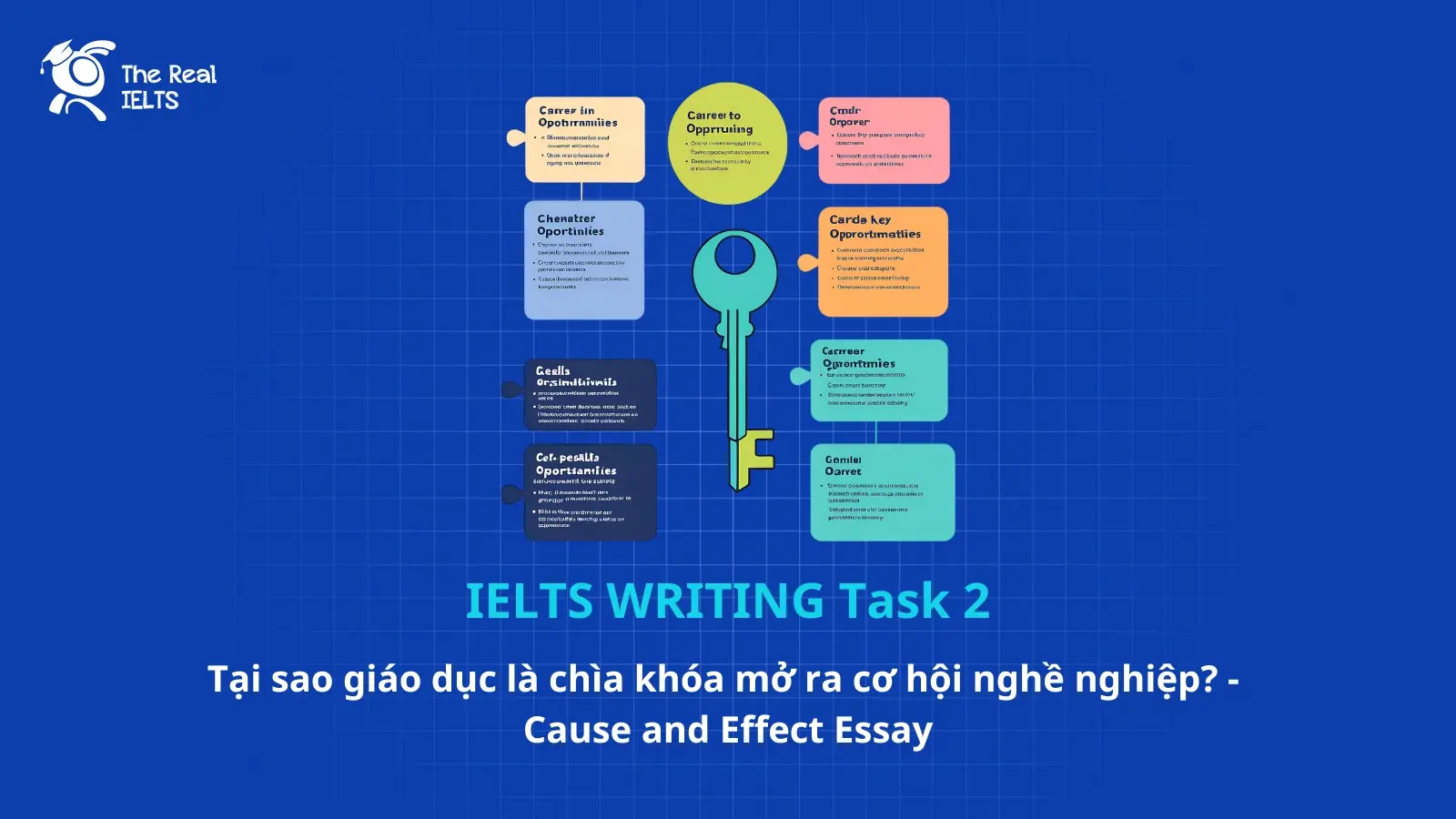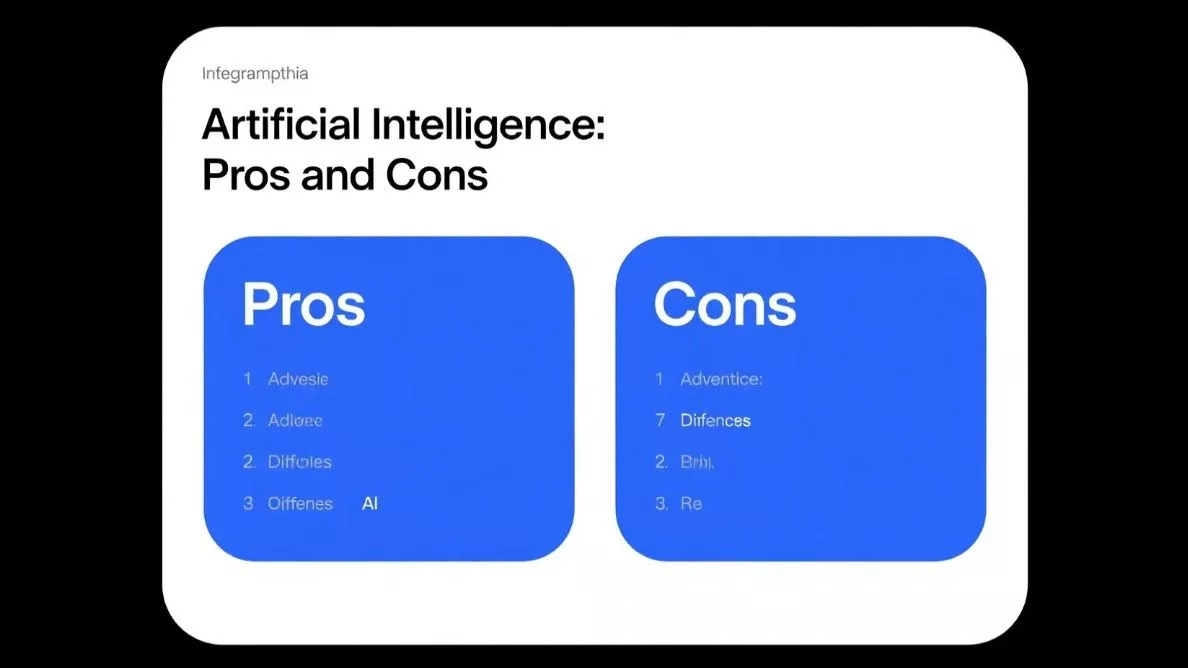Trong IELTS Writing Task 2, dạng Cause and Effect Essay yêu cầu thí sinh phân tích nguyên nhân và kết quả của một vấn đề. Giáo dục được xem là yếu tố quan trọng quyết định cơ hội nghề nghiệp, ảnh hưởng đến thu nhập và chất lượng cuộc sống. Vậy tác động của giáo dục là gì?
Đề bài IELTS Writing Task 2: Tại sao giáo dục là chìa khóa mở ra cơ hội nghề nghiệp? – Cause and Effect Essay
Higher education is often linked to better job prospects. What are the reasons behind this, and what effects does it have on individuals and society?
Câu trả lời 1
Essay Structure: Cause and Effect
- Introduction
- Introduce the topic by paraphrasing the statement.
- State that higher education is linked to better job opportunities and mention that the essay will discuss the reasons and effects of this connection.
- Body Paragraph 1: Causes – Why Higher Education Leads to Better Job Prospects
- Specialized Knowledge and Skills: Higher education provides in-depth training for professional fields.
- Increased Employability: Employers prioritize candidates with advanced degrees.
- Networking and Career Opportunities: Universities provide access to industry connections and internships.
- Body Paragraph 2: Effects – Impact on Individuals and Society
- Higher Income and Career Stability: Degree holders tend to earn more and have secure jobs.
- Reduced Unemployment Rates: Educated workers are less likely to be jobless.
- Economic Growth and Social Development: A highly educated workforce boosts national productivity.
- Conclusion
- Summarize the key points.
- Reinforce the idea that investing in higher education benefits both individuals and society.
Sample Essay: Higher Education and Job Prospects
Introduction
Higher education is widely regarded as a gateway to better job opportunities, as it equips individuals with specialized knowledge and skills required in today’s competitive job market. As a result, university graduates often enjoy higher salaries, greater job security, and better career progression. This essay will explore the reasons behind the strong link between higher education and employment, as well as the effects of this trend on individuals and society.
Body Paragraph 1: Causes – Why Higher Education Improves Job Prospects
One of the main reasons higher education leads to better career opportunities is that it provides specialized knowledge and technical skills essential for many professions. Fields such as medicine, engineering, and law require advanced academic training, making university education a necessity. Furthermore, higher education enhances employability, as employers often prioritize candidates with degrees due to their ability to analyze complex problems and adapt to workplace challenges. Additionally, universities offer networking opportunities and career support, helping students secure internships and build professional relationships that lead to job placements.
Body Paragraph 2: Effects – Impact on Individuals and Society
The most significant effect of obtaining a higher education degree is higher income and job security. Studies have consistently shown that degree holders earn more than those without formal education, allowing them to enjoy a better standard of living. Moreover, higher education reduces unemployment rates, as qualified professionals are in greater demand across industries. On a broader scale, a highly educated workforce boosts economic growth and social development by increasing productivity, fostering innovation, and reducing social inequalities.
Conclusion
In conclusion, higher education is closely linked to better job prospects due to its role in providing essential skills, enhancing employability, and expanding professional networks. As a result, individuals benefit from financial stability and career advancement, while society as a whole experiences economic and social improvements. Therefore, investing in higher education remains one of the most effective ways to secure long-term career success and national progress.
Câu trả lời 2
Essay:
Higher education is commonly associated with improved career opportunities, as it equips individuals with specialized knowledge and skills required in various professions. This essay will explore the reasons behind this correlation and examine its impact on both individuals and society.
One primary reason why higher education leads to better job prospects is that many employers prefer candidates with formal qualifications. A degree serves as proof of expertise, making graduates more competitive in the job market. Additionally, universities help students develop critical thinking, problem-solving, and communication skills, which are essential in most professional fields. Another factor is that higher education often provides networking opportunities through internships, industry collaborations, and alumni connections, which can lead to better job placements.
The effects of this trend are significant for both individuals and society. On a personal level, those with higher education generally enjoy higher salaries, better job security, and greater career advancement opportunities. This financial stability can lead to an improved quality of life, access to better healthcare, and overall personal development. From a societal perspective, an educated workforce contributes to economic growth, innovation, and social progress. Countries with a higher percentage of university graduates tend to have lower unemployment rates and a more skilled labor force, which enhances productivity and competitiveness on a global scale.
In conclusion, higher education is closely linked to better job prospects due to employer preferences, skill development, and networking opportunities. This connection benefits individuals by providing financial stability and career growth, while also fostering economic and social advancement for society as a whole.raging lifelong learning, societies can create more employment opportunities for educated individuals. A comprehensive approach that combines education, experience, and adaptability is key to addressing this issue effectively.
Câu trả lời 3
The link between higher education and better job prospects is well-established, stemming from a variety of factors that benefit both individuals and society.
Reasons for the Link:
- Advanced Knowledge and Skills: Higher education provides individuals with in-depth knowledge and specialized skills in a particular field. This advanced training makes them more attractive to employers seeking expertise and a higher level of competence.
- Critical Thinking and Problem-Solving: Higher education cultivates critical thinking, analytical, and problem-solving abilities, which are highly valued by employers across various industries. Graduates are better equipped to analyze complex situations, develop innovative solutions, and adapt to changing work environments.
- Signal of Competence and Commitment: A degree or other higher education credential serves as a signal to employers, indicating a certain level of intellectual ability, perseverance, and commitment to learning. It acts as a filter in the hiring process, often making it easier for graduates to be considered for certain roles.
- Networking Opportunities: Universities and colleges provide ample opportunities for networking with professors, peers, alumni, and industry professionals. These connections can lead to internships, mentorship, and valuable job prospects.
- Access to Specialized Careers: Certain professions, such as medicine, law, engineering, and academia, require advanced degrees as a prerequisite. Higher education provides the necessary training and qualifications for entry into these specialized fields.
- Lifelong Learning and Adaptability: Higher education instills a mindset of lifelong learning and adaptability, equipping individuals with the skills and knowledge to navigate the evolving demands of the job market and pursue ongoing professional development.
Effects on Individuals:
- Increased Earning Potential: Higher education is often associated with higher salaries and greater earning potential over a lifetime. This financial stability can lead to improved quality of life and greater economic independence.
- Improved Career Opportunities: Graduates typically have access to a wider range of job opportunities and are more likely to secure higher-level positions with greater responsibility and growth potential.
- Enhanced Personal Development: Higher education contributes to personal growth by broadening horizons, fostering critical thinking, improving communication skills, and promoting self-awareness.
- Increased Employability: While not a guarantee, higher education generally increases an individual’s chances of finding and maintaining employment, particularly in knowledge-based economies.
Effects on Society:
- Economic Growth and Innovation: A highly educated workforce drives economic growth and innovation by contributing to increased productivity, technological advancements, and the development of new industries.
- Social Mobility: Higher education can promote social mobility by providing individuals from disadvantaged backgrounds with opportunities to improve their socioeconomic status and achieve upward mobility.
- Improved Public Health and Well-being: Higher education is correlated with improved health outcomes, increased civic engagement, and greater overall well-being.
- Reduced Crime Rates: Studies suggest a link between higher levels of education and lower crime rates, contributing to safer and more stable communities.
- Stronger Democracy: An educated populace is better equipped to participate in democratic processes, make informed decisions, and hold elected officials accountable.
While higher education offers significant benefits, it’s crucial to acknowledge that access and affordability remain significant challenges in many parts of the world. Addressing these issues is essential to ensuring that the transformative power of higher education is accessible to all, fostering a more equitable and prosperous society.
Câu trả lời 4
Introduction
Higher education is often associated with improved job prospects, higher salaries, and better career stability. Many employers prioritize candidates with university degrees, believing that they possess the necessary knowledge and skills for professional success. This essay will explore the reasons behind this connection and analyze its effects on individuals and society.
Reasons Why Higher Education Leads to Better Job Prospects
- Specialized Knowledge and Skills
Higher education provides individuals with in-depth knowledge and technical skills required in various fields such as medicine, engineering, law, and finance. Employers seek candidates with expertise that can only be gained through formal education. - Increased Employability and Job Security
Many companies prefer hiring graduates because they believe that formal education indicates a candidate’s ability to learn, adapt, and solve complex problems. Degree holders often have access to a wider range of job opportunities and are less likely to face unemployment. - Higher Salaries and Career Growth
Studies have shown that individuals with higher education tend to earn more than those without degrees. A university degree often serves as a stepping stone to higher-paying positions and career advancements. - Development of Soft Skills
In addition to technical knowledge, higher education helps students develop essential soft skills such as critical thinking, communication, teamwork, and leadership. These skills are highly valued in the workplace and contribute to long-term career success. - Networking and Industry Connections
Universities provide students with opportunities to build professional networks through internships, mentorship programs, and alumni associations. These connections can help graduates secure better job opportunities and advance in their careers.
Effects on Individuals and Society
Effects on Individuals
- Improved Quality of Life
Higher education often leads to better job opportunities, financial stability, and access to healthcare, housing, and other necessities, resulting in an improved standard of living. - Greater Career Satisfaction
Individuals with higher education tend to have more career options and are more likely to work in fields that align with their interests and skills, leading to greater job satisfaction. - Increased Confidence and Independence
Education enhances problem-solving abilities and decision-making skills, allowing individuals to become more confident and independent in both professional and personal life.
Effects on Society
- Economic Growth and Development
A well-educated workforce contributes to innovation, productivity, and economic growth. Countries with high levels of education tend to have stronger economies and higher living standards. - Reduced Unemployment and Poverty Rates
Higher education reduces unemployment by equipping individuals with skills that match job market demands. This, in turn, decreases poverty rates and leads to a more stable society. - Social Mobility and Equality
Education provides individuals from different backgrounds with opportunities to improve their socioeconomic status, promoting equality and reducing income disparities. - Civic Engagement and Social Responsibility
Educated individuals are more likely to participate in social and political activities, contribute to their communities, and advocate for positive societal changes.
Conclusion
Higher education enhances job prospects by providing specialized knowledge, increasing employability, and fostering career growth. Its impact extends beyond individuals, benefiting society by driving economic development, reducing poverty, and promoting social progress. While higher education is valuable, it should be complemented with practical experience and lifelong learning to maximize its benefits.to the evolving job market, individuals can improve their employability and secure fulfilling careers.
Câu trả lời 5
Introduction
Higher education is widely associated with better job prospects, as it provides individuals with specialized knowledge, skills, and qualifications required in many professions. This connection between education and employment has significant effects on both individuals and society. This essay will explore the reasons why higher education leads to better job opportunities and discuss its impact.
Reasons Why Higher Education Leads to Better Job Prospects
- Specialized Knowledge and Skills:
- Many professions, such as medicine, law, and engineering, require advanced education to gain expertise and qualifications.
- Higher education equips individuals with problem-solving, analytical, and critical-thinking skills that are valuable in various careers.
- Higher Employability and Career Advancement:
- Employers often prefer candidates with higher education as it demonstrates discipline, commitment, and expertise.
- A degree can open doors to managerial positions and long-term career growth.
- Higher Earning Potential:
- Studies show that individuals with higher education tend to earn more over their lifetime than those without a degree.
- Specialized degrees in high-demand fields lead to better-paying jobs and financial stability.
- Networking and Professional Opportunities:
- Universities provide students with access to professional networks, internships, and career placement services.
- Connections made during higher education can lead to job referrals and career advancement.
Effects of Higher Education on Individuals and Society
Effects on Individuals:
- Better Quality of Life:
- Higher education often leads to better salaries, improved job security, and access to better healthcare and living conditions.
- Personal Growth and Confidence:
- Higher education enhances critical thinking, creativity, and decision-making skills, making individuals more confident and independent.
- Job Market Competitiveness:
- With more people obtaining degrees, competition for jobs can increase, making it necessary for individuals to gain additional skills and experience.
Effects on Society:
- Economic Growth and Innovation:
- A highly educated workforce contributes to economic development by driving innovation, productivity, and entrepreneurship.
- Reduction in Unemployment and Poverty:
- Higher education increases employment rates, reducing poverty levels and improving overall societal well-being.
- Social Mobility and Equality:
- Education provides opportunities for people from different backgrounds to improve their social and economic status.
- Increased Civic Engagement:
- Educated individuals are more likely to participate in community service, political activities, and social causes, contributing to a more informed and active society.
Conclusion
Higher education is closely linked to better job prospects due to the knowledge, skills, and opportunities it provides. It benefits individuals by improving their career prospects and quality of life, while also contributing to economic growth and social stability. However, as job markets become more competitive, continuous learning and skill development remain essential for long-term success.
Câu trả lời 6
Higher education is widely associated with improved job opportunities, as it provides individuals with specialized knowledge and skills. This essay will explore the reasons why higher education leads to better career prospects and examine its effects on both individuals and society.
Reasons Why Higher Education Improves Job Prospects
- Specialized Knowledge and Skill Development
Higher education equips individuals with in-depth knowledge and practical skills required in various fields. Professions such as medicine, law, and engineering demand formal education to ensure that professionals meet industry standards. - Increased Employability and Job Market Competitiveness
Employers often prefer candidates with higher education degrees because they demonstrate expertise, discipline, and the ability to solve complex problems. A university degree enhances an individual’s competitiveness in a highly saturated job market. - Opportunities for Career Advancement
Many managerial and leadership roles require advanced education, such as master’s degrees or professional certifications. Employees with higher education qualifications are more likely to be promoted and secure high-paying positions.
Effects of Higher Education on Individuals and Society
- Higher Earning Potential and Financial Stability
Research indicates that individuals with university degrees generally earn higher salaries than those without formal education. This financial stability leads to a better quality of life and economic security. - Reduced Unemployment and Increased Job Security
Higher education reduces the risk of unemployment by providing individuals with credentials that are in demand. Educated professionals are more adaptable to changes in the job market and less likely to experience long-term joblessness. - Positive Impact on Economic and Social Development
A well-educated workforce contributes to national growth by driving innovation, increasing productivity, and reducing poverty levels. Societies with high education levels often experience lower crime rates, improved public health, and greater social stability.
Conclusion
Higher education enhances career prospects by providing specialized knowledge, increasing employability, and opening doors to career advancement. Its effects extend beyond individual benefits, fostering economic growth and social progress. Therefore, investing in higher education remains crucial for both personal and societal development.
Câu trả lời 7
Higher education is widely regarded as a pathway to better job opportunities, higher income, and career growth. Many employers prioritize candidates with university degrees, as they possess specialized knowledge and essential skills. This essay will examine the reasons why higher education improves job prospects and discuss its effects on individuals and society.
Reasons Why Higher Education Leads to Better Job Prospects
One of the primary reasons is that higher education equips individuals with specialized knowledge and technical skills required in professional fields. Many careers, such as medicine, engineering, law, and finance, require advanced education and formal training. Without a degree, individuals may not qualify for such high-paying and stable jobs.
Another reason is that higher education enhances problem-solving, critical thinking, and communication skills. Universities encourage students to analyze complex issues, develop solutions, and express their ideas effectively. These skills are highly valued by employers and can increase an individual’s competitiveness in the job market.
Additionally, a university degree serves as a signal of dedication and discipline. Completing higher education requires years of commitment, which demonstrates perseverance and the ability to handle responsibilities. Employers often prefer candidates with degrees because they believe such individuals are more capable of handling professional tasks and adapting to workplace challenges.
Effects of Higher Education on Individuals and Society
For individuals, obtaining higher education leads to increased employability and financial stability. Graduates have access to a broader range of job opportunities and are more likely to secure high-paying positions. This, in turn, improves their standard of living and provides greater financial security for their families.
From a societal perspective, a highly educated workforce contributes to economic growth. Countries with a strong education system experience lower unemployment rates, higher productivity, and greater innovation. Businesses benefit from skilled professionals who can drive technological advancements and improve efficiency.
Moreover, higher education promotes social mobility and reduces income inequality. It enables individuals from disadvantaged backgrounds to access better job opportunities and improve their socio-economic status. Educated individuals are also more likely to participate in civic activities, contribute to their communities, and make informed decisions that benefit society as a whole.
Conclusion
In conclusion, higher education improves job prospects by providing specialized knowledge, valuable skills, and a competitive advantage in the labor market. Its effects extend beyond individuals, benefiting society through economic growth, reduced inequality, and increased innovation. Therefore, investing in higher education is essential for both personal success and societal progress.tential. Its positive impact extends beyond individuals, contributing to economic development and social mobility. Therefore, investing in education is crucial for both personal and societal progress.
Câu trả lời 8
Introduction
Higher education is widely regarded as a crucial factor in securing better job opportunities. It equips individuals with specialized knowledge and skills, increasing their employability and earning potential. This essay will explore the reasons why higher education leads to improved job prospects and examine its impact on both individuals and society.
Reasons Why Higher Education Improves Job Prospects
- Specialized Knowledge and Skills
Higher education provides individuals with in-depth knowledge and technical expertise relevant to specific industries. For example, careers in medicine, law, and engineering require formal academic training, ensuring that professionals meet industry standards and are well-prepared for their roles. - Higher Employability and Job Security
Employers often prioritize candidates with higher education qualifications because they demonstrate advanced problem-solving skills, critical thinking, and the ability to handle complex tasks. University graduates are generally more competitive in the job market, reducing their chances of unemployment. - Increased Earning Potential
Studies show that individuals with higher education degrees tend to earn more than those with lower qualifications. A degree often leads to higher-paying positions and better financial stability. For instance, professionals in fields such as finance and technology receive significantly higher salaries compared to those with only a high school diploma. - Opportunities for Career Advancement
Higher education opens doors to leadership positions and career growth. Many companies prefer promoting employees who have advanced degrees, as they are perceived to have better managerial and strategic skills. Additionally, continuous education and professional development can further enhance career prospects.
Effects of Higher Education on Individuals and Society
- Improved Quality of Life
Individuals with higher education tend to enjoy better living standards due to higher incomes. They have access to quality healthcare, housing, and other essential services, contributing to overall well-being and life satisfaction. - Economic Growth and Innovation
A well-educated workforce drives economic development by fostering innovation, increasing productivity, and creating new industries. Countries with higher education rates often experience stronger economic growth, as educated professionals contribute to technological advancements and business expansion. - Reduced Unemployment and Poverty
Societies with a higher proportion of educated individuals tend to have lower unemployment rates and reduced poverty levels. When people have access to quality education and stable employment, they are less likely to depend on government aid and social welfare programs. - Greater Social Mobility
Higher education provides opportunities for individuals to improve their socio-economic status. It allows people from disadvantaged backgrounds to break the cycle of poverty and achieve financial independence, leading to a more equal and fair society.
Conclusion
In conclusion, higher education significantly enhances job prospects by providing specialized skills, increasing employability, and improving earning potential. Its positive impact extends beyond individuals, contributing to economic development, social mobility, and overall societal progress. Therefore, investing in higher education is essential for personal and national growth.















